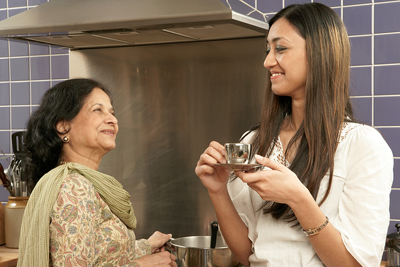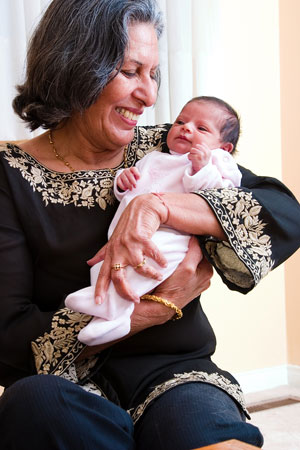Should grandma have a say? Advice for parents and grandparents.
By Nadia Shah @desiinlaws & online at southasianinlaws.com

Columnist, In-Law Corner
“When dealing with our kids, in-laws and grandchildren, we should remember that we are not the parents. We had our turn, and I guarantee we made just as many mistakes as we think they are making.”
I found this quote to be a very insightful one in regards to parenting grandchildren, the topic we explore below.
With the upcoming birth of my first child, my parents and my in-laws are getting ready to become grandparents. Naturally, both sets are as excited, if not more excited, than we are. But, of course, with this new change in our extended family, differing opinions in parenting will undoubtedly arise.
To avoid unnecessary and unneeded conflict, it’s helpful to keep the following few things in mind:
For Grandparents:

- Try to embrace the role of NOT being a parent. In fact, savor it. Just think about it for a second: now, you don’t have to raise them. You aren’t responsible for the outcome of your grandchild’s life or livelihood, and you don’t have to discipline him or her on a daily basis. This time you can simply enjoy the quality time you have with them, without having to worry about all the work.
- Remember, you were a new parent once too. Take a second to think about when your own kids were younger. You probably didn’t want your parents or in-laws criticizing your parenting style, and chances are you experienced some conflict as a result. Try to spare your children from the same challenges.
- Believe in your children. Respect their right to parent how they want and have faith in their abilities. Unfortunately, many South Asians correlate respect with agreement, which obviously isn’t the best mentality. We all have the ability to respect each other without having to agree with each other, and the same applies for disagreements in parenting styles. Ultimately, parents have the right to decide how their kids are raised.
- The best parenting techniques aren’t always what they used to be. With technology, new research, and even new laws, things have changed a little, and in some cases a lot. You should avoid leaning too heavily on the “that’s how we used to do it” philosophy. While it can be helpful in certain situations, remember that many people 30 years ago didn’t even use a car seat for their infants. In the time since there have been countless improvements in health and safety regulations and recommendations. There are instances where the old ways are still the best, but you must remember that times have changes, and mostly for the better.

- Make sure your relationship with your child and his or her spouse is strong. It goes without saying that if you want more influence in your grandchild’s upbringing, it would help to have a good relationship with your son/daughter and son/daughter-in-law first. Try to think of the birth of your new grandchild as an opportunity to address and solve any conflicts that could get in the way later. And remember that it’s never too late to talk things out.
For Parents:

- Your parents and in-laws usually have the best intentions. Don’t forget that your parents and in-laws are most likely genuinely excited to be part of your new child’s life. It’s important to remember that any advice, no matter how well or how poorly it’s delivered, comes from a place of love.
- Grandparents enrich their grandchildren’s lives. Some people never get to experience the bond between a grandparent and a grandchild. But those that have almost always cherish it. If your child has an opportunity to experience that bond, encourage and support it.
- Don’t ignore advice from your in-laws/parents. They have a tremendous amount of experience, and they’ve been through many of the challenges you’re about to face, so swiftly dismissing their advice would be foolish. Listen to it, take it into consideration if it’s useful, but then make your own decision on what’s best for your children.
- Your parents did a pretty good job. Everyone has their shortcomings, but it’s important to remember that your parents made you who you are today, and chances are they did pretty well. Your in-laws also must have done well raising your spouse, otherwise you probably wouldn’t be together. Cut them some slack; more often than not, they will be great grandparents to your kids.

- Your kids know what’s going on. They’re much more aware of the family dynamics than we give them credit for. If grandparents are actively and openly going against the rules you’ve set for your children, you run the risk of your kids losing respect for your rules, or worse, your authority. And it works both ways. If your kids see you disrespecting their grandparents’ way of doing things, they may lose some respect for them or their rules. It’s important to be clear with your parents, and it’s important to be careful around your kids.
- Many of us, South Asians especially, also must take another aspect into consideration: Living with in-laws. Many South Asian adults live with their parents and/or in-laws, especially when they’re elderly. This also means that these grandparents will naturally have more influence over your child’s upbringing. If you find yourself in this situation, remember that boundaries are important. They need to be clearly set for a peaceful household. Have an open discussion with your parents or in-laws about a few of the above topics, and discuss expectations, hopes, and plans, before your kids are born, if possible.

- Lastly, and this can sometimes be an overused cliché, but it really does pay to pick your battles. You can’t monitor and enforce your rules every waking moment. You can’t always be there to say no when, for example, grandma or grandpa let the little ones stay up an hour past their bedtime. Sometimes you have to let things go, and trust that your kids will be fine. And, as always, remember that different rules apply for abusive in-laws and parents.



[…] http://masalamommas.com/2013/07/16/should-grandparents-have-a-say-in-your-parenting/ […]